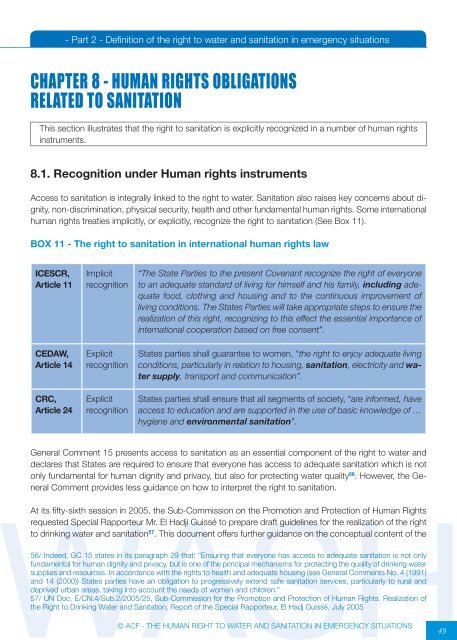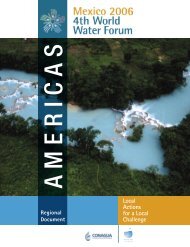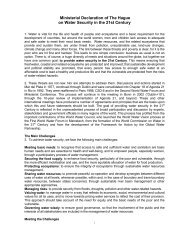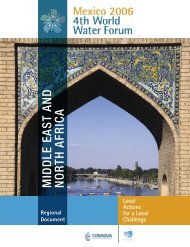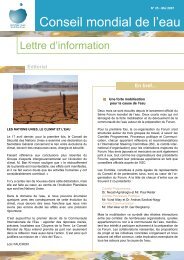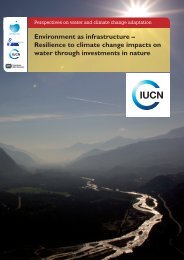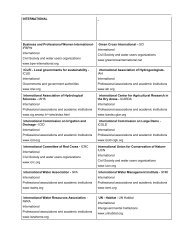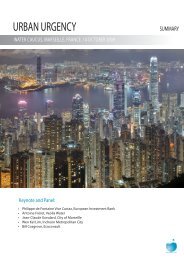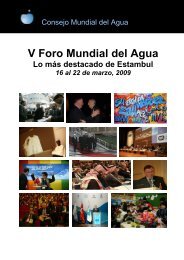the human right to water and sanitation in emergency situations
the human right to water and sanitation in emergency situations
the human right to water and sanitation in emergency situations
You also want an ePaper? Increase the reach of your titles
YUMPU automatically turns print PDFs into web optimized ePapers that Google loves.
- Part 2 - Def<strong>in</strong>ition of <strong>the</strong> <strong>right</strong> <strong>to</strong> <strong>water</strong> <strong>and</strong> <strong>sanitation</strong> <strong>in</strong> <strong>emergency</strong> <strong>situations</strong><br />
CHApTER 8 - HUMAN RIGHTS OblIGATIONS<br />
RElATED TO SANITATION<br />
This section illustrates that <strong>the</strong> <strong>right</strong> <strong>to</strong> <strong>sanitation</strong> is explicitly recognized <strong>in</strong> a number of <strong>human</strong> <strong>right</strong>s<br />
<strong>in</strong>struments.<br />
8.1. Recognition under Human <strong>right</strong>s <strong>in</strong>struments<br />
Access <strong>to</strong> <strong>sanitation</strong> is <strong>in</strong>tegrally l<strong>in</strong>ked <strong>to</strong> <strong>the</strong> <strong>right</strong> <strong>to</strong> <strong>water</strong>. Sanitation also raises key concerns about dignity,<br />
non-discrim<strong>in</strong>ation, physical security, health <strong>and</strong> o<strong>the</strong>r fundamental <strong>human</strong> <strong>right</strong>s. Some <strong>in</strong>ternational<br />
<strong>human</strong> <strong>right</strong>s treaties implicitly, or explicitly, recognize <strong>the</strong> <strong>right</strong> <strong>to</strong> <strong>sanitation</strong> (See Box 11).<br />
BoX 11 - The <strong>right</strong> <strong>to</strong> <strong>sanitation</strong> <strong>in</strong> <strong>in</strong>ternational <strong>human</strong> <strong>right</strong>s law<br />
ICESCR,<br />
Article 11<br />
CEDAW,<br />
Article 14<br />
CRC,<br />
Article 24<br />
Implicit<br />
recognition<br />
Explicit<br />
recognition<br />
Explicit<br />
recognition<br />
“The State Parties <strong>to</strong> <strong>the</strong> present Covenant recognize <strong>the</strong> <strong>right</strong> of everyone<br />
<strong>to</strong> an adequate st<strong>and</strong>ard of liv<strong>in</strong>g for himself <strong>and</strong> his family, <strong>in</strong>clud<strong>in</strong>g adequate<br />
food, cloth<strong>in</strong>g <strong>and</strong> hous<strong>in</strong>g <strong>and</strong> <strong>to</strong> <strong>the</strong> cont<strong>in</strong>uous improvement of<br />
liv<strong>in</strong>g conditions. The States Parties will take appropriate steps <strong>to</strong> ensure <strong>the</strong><br />
realization of this <strong>right</strong>, recogniz<strong>in</strong>g <strong>to</strong> this effect <strong>the</strong> essential importance of<br />
<strong>in</strong>ternational cooperation based on free consent”.<br />
States parties shall guarantee <strong>to</strong> women, “<strong>the</strong> <strong>right</strong> <strong>to</strong> enjoy adequate liv<strong>in</strong>g<br />
conditions, particularly <strong>in</strong> relation <strong>to</strong> hous<strong>in</strong>g, <strong>sanitation</strong>, electricity <strong>and</strong> <strong>water</strong><br />
supply, transport <strong>and</strong> communication”.<br />
States parties shall ensure that all segments of society, “are <strong>in</strong>formed, have<br />
access <strong>to</strong> education <strong>and</strong> are supported <strong>in</strong> <strong>the</strong> use of basic knowledge of …<br />
hygiene <strong>and</strong> environmental <strong>sanitation</strong>”.<br />
General Comment 15 presents access <strong>to</strong> <strong>sanitation</strong> as an essential component of <strong>the</strong> <strong>right</strong> <strong>to</strong> <strong>water</strong> <strong>and</strong><br />
declares that States are required <strong>to</strong> ensure that everyone has access <strong>to</strong> adequate <strong>sanitation</strong> which is not<br />
only fundamental for <strong>human</strong> dignity <strong>and</strong> privacy, but also for protect<strong>in</strong>g <strong>water</strong> quality 56 . However, <strong>the</strong> General<br />
Comment provides less guidance on how <strong>to</strong> <strong>in</strong>terpret <strong>the</strong> <strong>right</strong> <strong>to</strong> <strong>sanitation</strong>.<br />
At its fifty-sixth session <strong>in</strong> 2005, <strong>the</strong> Sub-Commission on <strong>the</strong> Promotion <strong>and</strong> Protection of Human Rights<br />
requested Special Rapporteur Mr. El Hadji Guissé <strong>to</strong> prepare draft guidel<strong>in</strong>es for <strong>the</strong> realization of <strong>the</strong> <strong>right</strong><br />
<strong>to</strong> dr<strong>in</strong>k<strong>in</strong>g <strong>water</strong> <strong>and</strong> <strong>sanitation</strong> 57 . This document offers fur<strong>the</strong>r guidance on <strong>the</strong> conceptual content of <strong>the</strong><br />
56/ Indeed, GC 15 states <strong>in</strong> its paragraph 29 that: “Ensur<strong>in</strong>g that everyone has access <strong>to</strong> adequate <strong>sanitation</strong> is not only<br />
fundamental for <strong>human</strong> dignity <strong>and</strong> privacy, but is one of <strong>the</strong> pr<strong>in</strong>cipal mechanisms for protect<strong>in</strong>g <strong>the</strong> quality of dr<strong>in</strong>k<strong>in</strong>g <strong>water</strong><br />
supplies <strong>and</strong> resources. In accordance with <strong>the</strong> <strong>right</strong>s <strong>to</strong> health <strong>and</strong> adequate hous<strong>in</strong>g (see General Comments No. 4 (1991)<br />
<strong>and</strong> 14 (2000)) States parties have an obligation <strong>to</strong> progressively extend safe <strong>sanitation</strong> services, particularly <strong>to</strong> rural <strong>and</strong><br />
deprived urban areas, tak<strong>in</strong>g <strong>in</strong><strong>to</strong> account <strong>the</strong> needs of women <strong>and</strong> children.”<br />
57/ UN Doc. E/CN.4/Sub.2/2005/25, Sub-Commission for <strong>the</strong> Promotion <strong>and</strong> Protection of Human Rights. Realization of<br />
<strong>the</strong> Right <strong>to</strong> Dr<strong>in</strong>k<strong>in</strong>g Water <strong>and</strong> Sanitation, Report of <strong>the</strong> Special Rapporteur, El Hadj Guissé, July 2005<br />
© ACF - THE HUMAN RIGHT TO WATER AND SANITATION IN EMERGENCY SITUATIONS<br />
49


